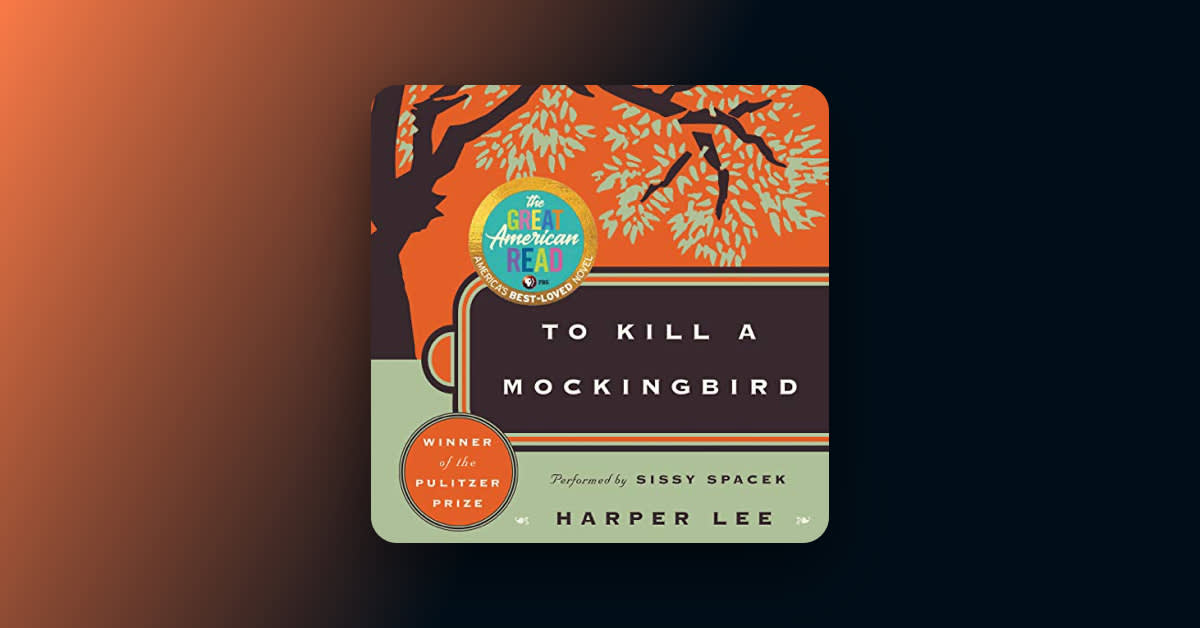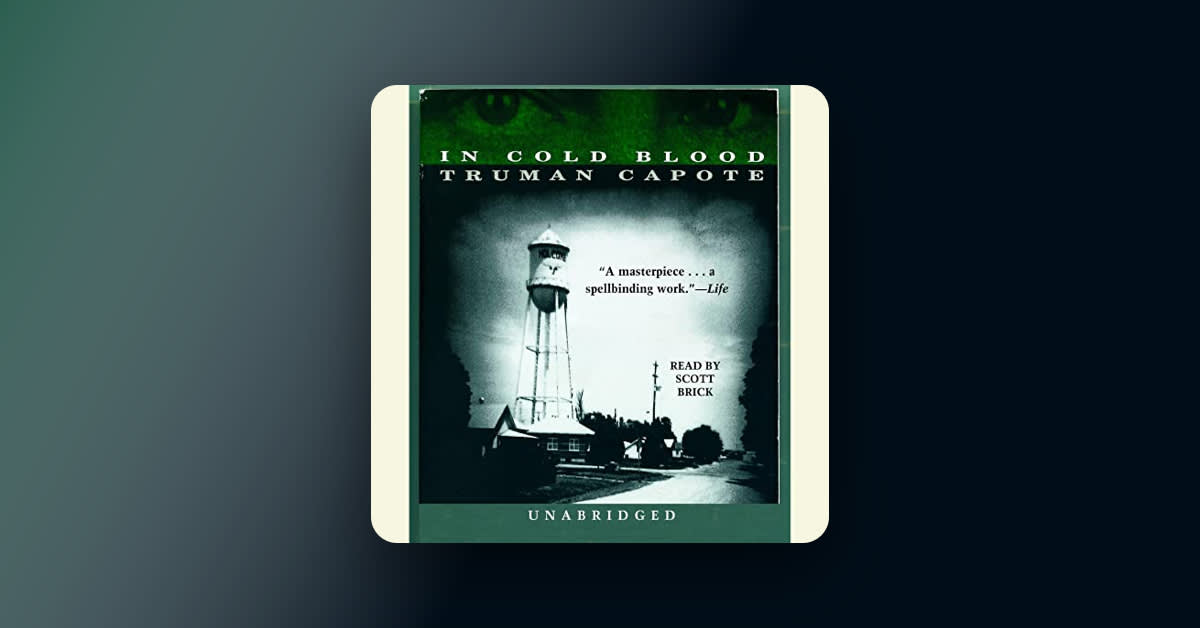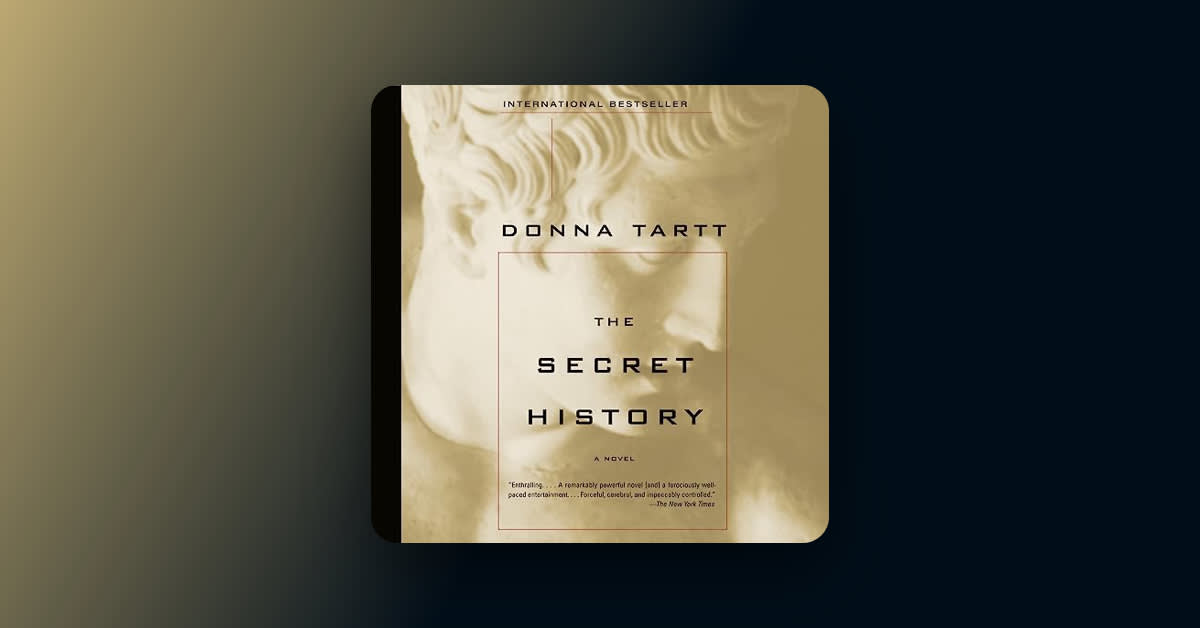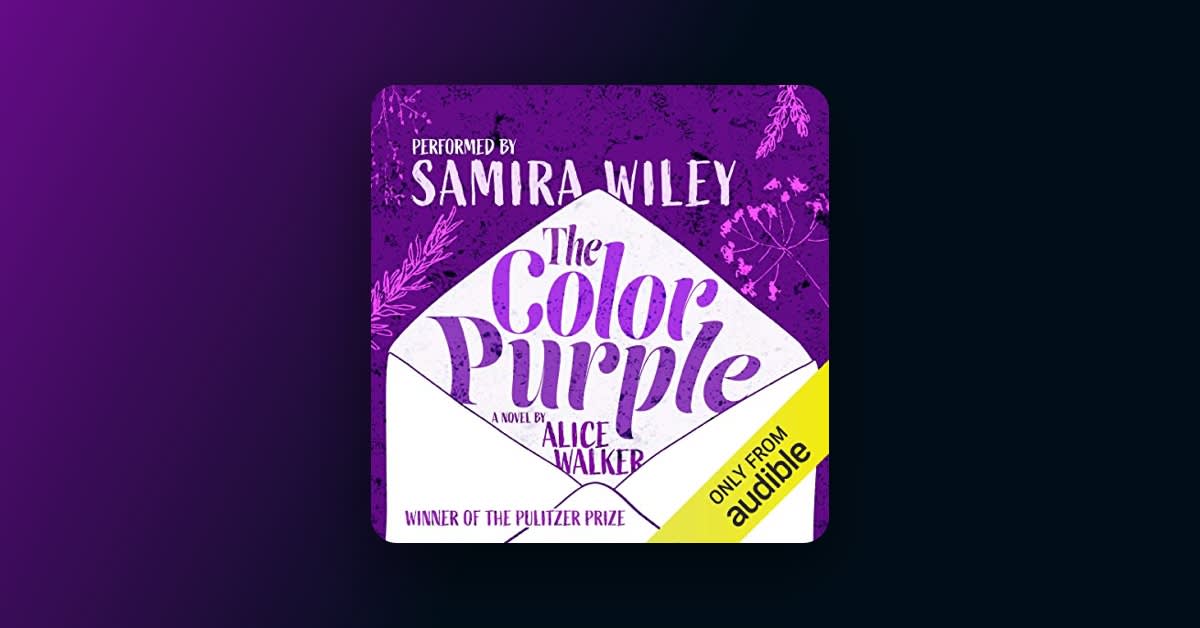Why it’s essential
Sissy Spacek’s clear-as-a-bell Southern lilt immediately places you in young Scout Finch’s world, primed and ready for Harper Lee’s Pulitzer Prize-winning story of honor and injustice.
Featured in The Audible Essentials Top 100.
What is To Kill a Mockingbird about?
Set during the Great Depression, To Kill a Mockingbird traces a young girl’s awakening to racism and prejudice in her small Alabama town. It centers on the narrator, Jean Louise "Scout" Finch, and her widowed father, Atticus, a prominent, righteous lawyer who takes on the daunting case of defending a Black man wrongfully accused of sexually assaulting a white woman.
Editor’s review
Mysia is a book person who loves escaping into twisty mysteries and contemporary fiction driven by complicated characters.
I first read To Kill a Mockingbird when I was a 'tween for an English class assignment. As a bookish kid, I remember being struck by Harper Lee’s writing—the vivid sense of place (small-town Alabama) and time (the Depression era), memorable phrases like "the head-shaking, quelling of nausea and Jem-yelling," and casual remarks rich in wisdom. And, of course, I was awed by Atticus Finch. What girl wouldn’t want this wise, calm, quietly righteous man for a father? His unshakable conviction and courage in the face of prejudice, cruelty, and injustice was inspiring. Thanks to Atticus Finch, I became obsessed with a real-life legendary lawyer, Clarence Darrow, and devoured every book written by or about him I could find. For a minute, I contemplated pursuing a career in law. Then, I got called for jury duty, realized that gripping courtroom drama was rare, and channeled my fascination into reading legal thrillers by John Grisham.
For me, Mockingbird was all about Atticus. Even though I was a voracious reader from a young age, I didn’t connect with Scout, a precocious 9-year-old—until my daughter, a tomboy, became a 'tween. As a white mom to a Black daughter, I have always been conscious of race. But in 2012, when Trayvon Martin, a 17-year-old African American boy, was fatally shot on a street in Florida for looking suspicious—and his killer was acquitted—I became painfully aware of racism and its dangers. Even though we lived in a diverse city in northern New Jersey, I began to fear for my daughter’s safety. Lucero couldn’t understand why I suddenly objected to her wearing a hoodie and lectured her about the importance of avoiding strangers and the police. Trying to explain racism and injustice to my innocent, trusting daughter made me think of Scout. And so, I found myself longing to revisit the novel I fell in awe with in middle school and get reacquainted with its young narrator. A few years later, when Academy Award-winning actress Sissy Spacek signed on to narrate the audiobook, I decided to go back and give Harper Lee’s classic a listen as a mother.
While centered on a racially charged case—a Black man falsely accused of the brutal rape of a young white woman—To Kill a Mockingbird is, at its heart, Scout’s coming-of-age story. It’s told from Scout’s perspective, both as a woman looking back on her childhood and as a child awakening to the harsh realities of life in Maycomb, Alabama, and her father’s commitment to doing what’s right and just, regardless of the risks or repercussions. Narrating the audiobook, Spacek, a native Texan, draws us into the rhythm and routines of life in a small Southern town. What’s more, she embodies Scout—in all her frustrations, enthusiasm, and idealism—and her gradual awareness of the prejudice all around her. As the novel progresses, Scout develops a moral compass and sense of empathy. Guided by her father’s example and gentle reprimands, she comes to see folks in Maycomb who have been ostracized and demonized—including the town’s Black residents and her reclusive, seemingly creepy neighbor, "Boo" Radley—as people, pure and simple. And that’s what ultimately saves her.
Set during the Great Depression and first published in 1960, amidst the burgeoning civil rights movement sweeping the Jim Crow South, To Kill a Mockingbird deals with racially and sexually charged issues that, sadly, remain relevant. In the wake of Black Lives Matter and #MeToo and the disturbing resurgence in white supremacy, it’s hard not to feel a sense of alarm and despair for the future of our country. Yet, Atticus Finch gives me hope that there are people who are willing to brave threats to speak out for what’s right and what’s just. Right now, America needs real, flesh-and-blood people like the caring widowed father and brave, ethical lawyer Harper Lee gave us.
Did you know?
Although To Kill a Mockingbird is a work of fiction not a memoir, there are striking similarities between the novel and the author’s life. The book is set in Maycomb, Alabama, a fictional small town based on Monroeville, Alabama, where Harper Lee grew up. Like Scout, Lee was a tomboy. She and Scout would have been about the same age the year the novel took place, and her brother, Edwin, was around four years older, just like Scout's brother, Jem. Lee gave the family her mother’s maiden name, Finch. And the character of Atticus Finch was inspired by her father, a righteous and soft-spoken lawyer. A.C. Lee defended two Black men accused of murder in Monroeville. He lost the case.
Harper Lee modeled the character of Dill, the neighbor boy in Mockingbird, after her childhood next-door neighbor, and one of her closest long-time friends, celebrated author Truman Capote. Both misfits in their close-knit Southern town, the future authors often hung out together and even shared Lee’s typewriter. In Capote’s first book, Other Voices, Other Rooms, the character of Idabel Thompkins is a cantankerous tomboy modeled on Harper Lee.
Most fans of To Kill a Mockingbird aren’t familiar with Michael Brown, a songwriter for industrial musicals (which literally sang the praises of products) and his wife, Joy. Yet, without the Browns, the literary classic might never have been written. After dropping out of law school, Lee moved to New York City and was working as an airline reservationist when she was introduced to Michael Brown by a mutual friend, Truman Capote. Before long, Michael and Joy became close friends with Lee—so close that she let them read some of her writing. In 1956, the Browns gave Lee a generous Christmas gift—enough money to quit her job and devote a year to writing whatever she wanted. The result was the first draft of the now classic novel. After being rejected by 10 publishers, the manuscript was accepted by Lippincott, and following what Lee described as "a long and hopeless period of writing the book over and over again," To Kill a Mockingbird was published in 1960.
To Kill a Mockingbird won the Pulitzer Prize in 1961 and continues to sell almost a million copies a year. It also remains one of the most frequently challenged and banned books in the US for its racially and sexually charged themes.
What listeners said
"The perfect book and the perfect narrator come together here to create an American treasure. I don't have the vocabulary to speak highly enough of how special this book is on Audible. Sissy Spacek's narration of this story is genius … Her performance is not just technically perfect, it's illuminating. She's so smooth between characters. I can't even detect how she changes her voice and tone between Jem and Scout, but she does, just ever so slightly. It's hard to explain how amazing it is. I can see the dirt road, I can smell the dirty kid next to Scout in her class, I can feel the summer breeze on the back porch where they sleep. Yes, it's Harper Lee that creates that amazing imagery, but Spacek makes it an intimate experience that I felt honored to be a part of." —David, Audible listener
"To Kill a Mockingbird was published July 11, 1960, and has never gone out of print. When contemplating whether to review this (what I think is THE perfect novel), I had to wonder. ‘'s there really anything that hasn't already been said?' In this case, Sissy Spacek; no matter how many times you have read this novel, or even listened, Spacek, with her sweet drawl, IS Scout, speaking back through the years, recounting her story. She is the perfect choice for a perfect novel." —Mel, Audible listener
"Like many others, I've read this book a number of times and have always appreciated it as very fine work. Hearing it—rather than reading it—is a completely different experience. Simply said, I fell in love with it … Sissy Spacek does a terrific job with the material. Her narration isn't spectacular in a Will Patton or George Guidall kind of way. Rather, it's understated. She never gets in the way of the story. She's perfect as the older, wiser Scout looking back. I loved listening to her and the subtle way she reads the book and gives voice to its characters. Perhaps another narrator would have given the book a showier treatment. Spacek gives it authenticity." —B.J., Audible listener
"I had seen the movie about fifty years ago, and I remember thinking that Gregory Peck was the only man who could play Atticus Finch. Well, now comes Sissy Spacek, who plays all of the characters in the book with grace, gentleness and love. We get to know Scout, Jem and Atticus so completely, so intimately: they feel like our family, only better … This book is a true American masterpiece … You must listen to it yourself, at least once." —Richard, Audible listener
Content warning
Rape, incest, racial slurs
Quotes from To Kill a Mockingbird
"You never really understand a person until you consider things from his point of view... Until you climb inside of his skin and walk around in it."
"I wanted you to see what real courage is, instead of getting the idea that courage is a man with a gun in his hand. It's when you know you're licked before you begin, but you begin anyway and see it through no matter what."
"The one thing that doesn't abide by majority rule is a person's conscience."
"People generally see what they look for, and hear what they listen for."
"Until I feared I would lose it, I never loved to read. One does not love breathing."
Adaptations
To Kill a Mockingbird was adapted into a 1962 film, starring Gregory Peck as Atticus Finch, for which he won an Academy Award for Best Actor. A box-office success as well as critically acclaimed, the film was selected by the Library of Congress for preservation in the National Film Registry as "culturally, historically, or aesthetically significant" in 1995, and in 2003, the American Film Institute named Atticus Finch the greatest movie hero of the 20th century. In 2018, the beloved novel was adapted for the stage by Aaron Sorkin. During its Broadway run, Jeff Daniels took on the legendary role of the righteous lawyer.
About the author
Harper Lee (whose given name was Nelle Harper Lee) was born in 1926 in Monroeville, Alabama. She attended Huntingdon College and studied law at the University of Alabama. In 1949, she moved to New York City and took jobs—first at a bookstore, then as an airline reservation agent—while writing in her spare time. After publishing several long short stories, she found an agent in 1956 and received a generous gift from friends—a year's wages with the freedom to write whatever she pleased. Her acclaimed novel To Kill a Mockingbird was published in 1960 and received the Pulitzer Prize in 1961. Lee assisted her close friend Truman Capote in his research for his groundbreaking book, In Cold Blood. Lee received numerous honorary degrees and distinguished awards, including the Presidential Medal of Freedom in 2007. While confirmed to be an earlier draft of Mockingbird, her second novel, Go Set a Watchman, was published as a long-awaited sequel in 2015. She died in 2016.
About the performer
Sissy Spacek is an American actress and singer. Born and raised in Texas, she began her professional acting career in the early 1970s. Her breakout role came with Badlands (1973), which earned her a BAFTA nomination for Most Promising Newcomer to Leading Film Roles. She rose to international prominence with her portrayal of Carrie White in Brian De Palma's horror film Carrie (1976), for which she received her first Academy Award nomination. Spacek won the Academy Award for Best Actress for her portrayal of Loretta Lynn in the biographical musical film Coal Miner's Daughter (1980), and was nominated for a Grammy Award for her work on the soundtrack. More recently, she portrayed matriarch Sally Rayburn on the Netflix series Bloodline (2015–2017), Ruth Deaver on Hulu's Castle Rock (2018), and Ellen Bergman on the Amazon Prime Video psychological thriller series Homecoming (2018). In addition to her performance of narrating To Kill a Mockingbird, she narrates the audiobook versions of Carrie, Coal Miner's Daughter, and her memoir, My Extraordinary Ordinary Life.









